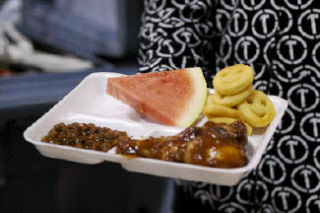A group of students at Islander Middle School are determined to replace the school’s polystyrene lunch trays with an eco-friendly, reusable alternative. In fact, this very goal spurred them to start the Gators Go Green recycling club last fall. And now that the club received a $1,600 grant from the Washington State Department of Ecology for its proposal, the project has moved from discussion to near reality.
“A few weeks ago, we got a call [from the Department of Ecology] and they told us we had won the grant. We’re so happy,” said club member Kaya McRuer.
Although the group asked for $3,000, the cost it will take to switch from disposable trays to reusable ones, the Department of Ecology said it would fund half of that amount. The students are determined to earn the remaining $1,400 and have already turned to the Parent Teacher Association (PTA), Associative Student Body (ASB) and other organizations for support.
“They’ve had a good response from the PTA and ASB in matching the funds that the Ecology Department provided. The Environmental Protection Agency also has grants we may look into,” said Kenlyn Emmerson, the Gators Go Green club supervisor.
Emmerson has been behind the eight-member club since day one. She was there when they wrote their mission statement. She helped them put their eco-friendly proposals to words, search out financial resources, and complete the application for a grant. Her role is that of a facilitator, yet the middle-schoolers do all the work.
“Really, the kids have totally taken control,” observed IMS Principal Mary Jo Budzius. “The girls came to me and were upset over the fact that we didn’t recycle in the lunch room. They said they wanted to start a club and take action.”
And they did.
In October 2007, a small group of seventh-grade girls began the Gators Go Green club with an ambitious mission: eliminate disposable polystyrene food trays from the lunchroom; increase recycling collection points for plastic drink bottles, cans and cartons; investigate solar panels as an alternative energy source at IMS; add yard waste recycling on campus for bathroom paper towels and food waste; and conduct an energy-use audit on campus.
With Emmerson’s help, the group — which has grown to include all three grades and one boy member — began focusing on its first goal: to replace the school’s polystyrene lunch trays, which take 900 years to decompose, with washable trays. The first step was determining the financial cost and potential resources.
“We needed to find a way to get money that didn’t drain the school,” said McRuer. And that is where the Department of Ecology comes in.
As part of its aim to “encourage Washington public schools to take steps necessary to embrace environmental sustainability,” the department developed the Terry Husseman Sustainable Public Schools Seed Award “to assist with costs involved in the initial start-up of basic sustainability programs.”
The Gators Go Green club is one of about 15 schools in the state to win the award — not just for its lunch tray proposal, but its recycling efforts overall.
From March 17 to 28, the Gators Go Green club organized a two-week conservation awareness campaign, hoping to involve other IMS students in their eco-friendly initiatives. The campaign focused on polystyrene lunch trays and their negative impact on the environment. After sharing their plan to introduce reusable trays to IMS, the club passed around a petition of support.
“We, the undersigned, support eliminating the styrofoam trays from the school cafeteria and replacing them with a more eco-friendly alternative,” the petition read.
In total, the club collected 300 signatures, 31 percent of the IMS population.
Club members also set out recycling bins in the lunch room and encouraged students to use them.
“We had parents give out candy to kids who recycled items,” said club member Karen Yuen. “We worked on that over the week. But after the candy, they didn’t recycle as much.”
Although the recycle bins worked for the first week, eventually the students contaminated the bins with non-recyclable trash, and so the project was stopped.
“The contamination rate rose above the recycling rate, so we pulled this,” said Budzius. “But it’s something we’re going to continue to work with and try to make successful.”
Before the Go Green team can turn the IMS cafeteria into a recycling haven, it still must tackle some key issues. On top of keeping students from contaminating the recycle bins with garbage, the club must inquire with school janitors and kitchen staff about the effects of switching to washable trays.
It will cost $300 alone to buy dishwasher racks for the trays. And the kitchen work required to manage the trays will also change. These are issues the club is planning to discuss with administrators and staff over the summer.
“Our original goal was to get the trays in by the end of the year,” McRuer said. “But we’re going to have discussion over the summer with janitors and other groups affected by this. Hopefully we can get the trays in next year.”
Meanwhile, the students are looking forward to their $1,600 award. Tomorrow, the club will travel to the state capitol in Olympia to receive the grant in an official ceremony. IMS is one of a dozen other public schools — all Seed Award winners — to be honored at the May 22 ceremony.
“It feels pretty awesome to know there are people who think [our project] is a good idea and will help sponsor us to get better trays and not kill the earth,” said club member Allison Froio.


